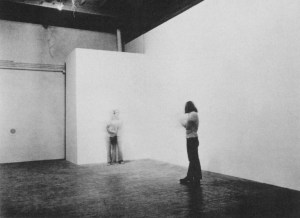A discussion of Mathieu Lindon’s Les hommes tremblent //
Benjamin Gagnon Chainey // “A man trembles in front of the building. The cold, fear, Parkinson’s? Should we call social services, the police, an ambulance? Alcohol, it doesn’t look like it. Hunger? Should we get him a sandwich? Is there something to do, or nothing, as usual? [1]” These five questions seem obvious for any city dweller, sensitive to the “visible” pain of the usually anonymous Other. Mathieu Lindon asks them from the get-go in his novel Les hommes tremblent, available since 2014 with the French publishing house P.O.L., but which has yet to be translated into English. The title, meaning “men tremble,” hints that these questions are, in fact, anything but obvious. The passersby unconcernedly come in and out of the Parisian building, in whose entrance hall a homeless man named Martin trembles besides his companion, named Martine, homeless like him, always in the same spot in their building. These five questions are directed at us, so-called concerned citizens; they are heavy with suffering that largely exceeds the specific cases of the marginal individuals they first seem to refer to.
As the novel unfolds, its sly characters blur their traces, making it increasingly difficult to pinpoint the origin of their utterances and to discern their identities, as well as that of the narrator. The trembling becomes generalized. The homeless man’s tremor, at the beginning of the novel, was but an initial impulse that disseminates and amplifies as it contaminates the building’s other language-bodies, reinforcing the impression that the edifice is an organism, a synecdoche for the contemporary city, Paris, which risks falling ill with an insidious penchant for security and a mixture of indifference and fear of the Other, the Stranger, the Unknown.
At the threshold of this novel, made up of 32 brief chapters, Mathieu Lindon’s writing and its narrator voice appear sober, without stylistic outbursts and little room for subjective impressions, content with the discreet tone of an observer who seems to be strolling around and inside the building, among its residents. As the narrator moves from one floor to another and from one character to the other, however, that voice also becomes unsteady, trembles. From the homeless language-body of Martin, the trembling propagates: to the building, and through it, synecdochally, to the city, constituting it as a tension between individuality and collectivity as it merges single identities into a discourse without origin. The novel, itself a language-body, little by little reveals its polyphonic nature, vibrating at the rhythm of shaky marginal voices, which gradually “contaminate” buildings and cities. “Men tremble when their land trembles, said Martin with a preacher’s tone” (HT, 10), and reciprocally, we could add, with a literary tone.
For, indeed, at the meeting point of discourses, at the crossroads of ethnology, anthropology, social analysis, politics, morals and ethics, Mathieu Lindon’s pen trembles like his homeless man. It constantly oscillates between the individual and the collective, between “solidarity or hostility” (HT, 150), in a continuous imbalance, as it tries to battle the “eternal aspiration for indifference” (HT, 150) that affects the inhabitants of the building where Martin and Martine (do not) live. That morning when Léa, an assistant nurse residing in the building, passed by Martin to go help “real sick people,” the death of Mr. Sowoka, that “mystery man” who “speaks alone and violently” (HT, 41), the juvenile revolt of “Cyrille, the Pernons’ teenager, who swore to his parents that Martin is a philosopher” (HT, 38)… Mathieu Lindon stages as much as he hides the obscene and what’s not in the scene, the amplitude of the little misery of a homeless man who could contaminate his fellow human beings: the blurring of boundaries between bodies and languages, between a building and a city that is all but enclosed upon itself.
If “obscenity has taken possession of the entrance hall” (HT, 21), it has also taken possession of Lindon’s writing as it – obscenity – has become the subversive battle cry to demand the right of marginal language-bodies to exist: their right to reside somewhere, to construct their own space, physical and discursive. Through Mathieu Lindon’s pen, the language-body’s struggle for the right to inhabit a space combines with the claim to speak of one’s own voice, as trembling as it may be. Despite an initial impression of anecdotal candor, Lindon’s Parisian tale portrays or constructs its inhabitants as so many “personalities” (HT, 66) whose words and actions are slyly eloquent in revealing the deceitful contradictions of a so-called community. A bold social critique, Lindon’s novel is all but innocent, and condemns a city guilty of speaking ill of the suffering of the Other. Are we, the readers, also guilty of passing by, from page to page, indifferent and unaffected by the homeless man’s trembling? Are we voyeurs, the narrator’s accomplices? “But,” he writes, “any notion of moral infraction is removed from voyeurism when the curious (whom we are) are called researchers” (HT, 108).
Featured Image from rbrudolph via Pixabay.
[1] Mathieu Lindon. 2014. Les hommes tremblent. Paris : Éditions P.O.L. p. 7. (My translation, hereafter HT)



